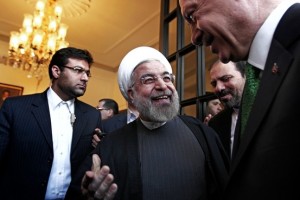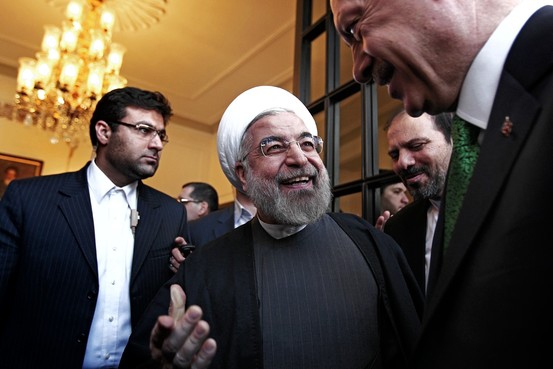 U.S. officials are fanning out across the globe, privately warning international executives not to commit too much as they re-engage with Iran during a temporary easing of sanctions.
U.S. officials are fanning out across the globe, privately warning international executives not to commit too much as they re-engage with Iran during a temporary easing of sanctions.The outreach echoes some of the statements U.S. officials have made in recent weeks cautioning about the limited and temporary nature of the sanctions relaxation. In recent days, senior U.S. officials have also started touring global commercial capitals�including London, Paris and Dubai�and meeting executives from blue-chip companies to hammer home the message.
Treasury Secretary Jacob Lew said in an interview on Friday that he has personally taken on the issue in meetings with hundreds of American and international business executives in recent weeks. This effort included meetings he held at the World Economic Forum in Davos, Switzerland last week.
"It's really important that businesses understand that we are continuing to monitor transactions and enforce sanctions," Mr. Lew said. "It's really been our focus that we don't have any misunderstandings."
The Western powers and Iran completed in January an interim deal for limited sanctions relief in exchange for heightened international scrutiny of Iran's nuclear program. The deal stretches six months through July, when the Western nations will reassess Iranian cooperation. Some areas of trade subject to the temporary relief include automobile and commercial aircraft parts, petrochemical purchases and humanitarian goods, such as food and medicine.
At a meeting at the U.S. Embassy in London this week, Peter Harrell, the U.S. State Department's deputy assistant secretary for threat finance and sanctions, met British and French executives�including representatives from�Royal Dutch Shell�RDSB.LN�-1.83%PLC, Total SA and the aircraft-engine division of Rolls-Royce PLC�to make it clear that any business now allowed with Iran must be limited to the six-month window of the deal, according to people familiar with the matter.
"The message we got is that you can't sign any long-term commitment," said one executive who participated in the London meeting. Spokesmen for Total, Shell and Rolls-Royce said they don't comment on meetings held by their executives.
Meanwhile, a group of French executives were invited to the U.S. Embassy in Paris on Friday for a similar meeting, according to two people familiar with the matter. The meeting was scheduled ahead of the planned arrival on Monday of a delegation of dozens of French executives in the Iranian capital, Tehran.
Iran Warnings
U.S. officials are warning global executives of the limits of easing Iran sanctions. Here's some of the relief:
- $4.2 billion of Iranian oil payments unfrozen.
- Ban on insuring tankers with Iranian crude lifted.
- Petrochemical exports allowed.
- Imports of auto and airplane parts allowed.
Critics of the agreement, including members of Congress, have complained that Tehran has reaped significant economic benefits from the deal, in addition to the sanctions relief.
They cite the strengthening of Iran's currency, the rial, since the agreement was announced in late November. And outside economic analysts estimate Iran's economic growth is expected to stabilize in the current fiscal year after contracting by 6% during the previous one.
"Iran's economy is showing signs of recovery after years of sanctions, due in no small part to the recent sanctions relief�and a perception that the Obama administration may no longer be committed to ratcheting up the economic pressure," said Mark Dubowitz of the Foundation for Defense of Democracies, which has advised Congress on Iran sanctions.
State Department officials declined to comment on specific meetings, but one official said Washington was reaching out to "the private sector globally to ensure that companies around the world understand the narrow scope of sanctions relief."
The purpose was also to make sure executives understood "the numerous U.S. and international sanctions on Iran that remain in force," this official said.
U.S. officials say they worry some executives may not fully understand the limited nature of the easing, and want to make it clear Washington is still ready to enforce remaining sanctions.
That is especially the case amid a public charm offensive by Tehran aimed at wooing Western businesses back to Iran.
Mr. Lew said in the interview that the pressure on Tehran will remain intense, as the majority of the sanctions remain in place and will be enforced. "People are focusing on incremental market impact, rather than the cumulative impact," he said. "You have to separate the two: Sanctions have had an enormous impact. The vast majority of the impact will still be felt. "
Last week, Iran's oil minister, Bijan Zanganeh, met Western oil and gas executives at a briefing at the World Economic Forum in Davos, mingling with�Chevron�Corp.�CVX�-4.14%and Shell among others.
"I understand that there is interest [by international companies in returning to Iran] and the Iranians are trying to play on this interest," said�David Cohen, the U.S. Treasury's undersecretary for terrorism and financial intelligence, during an interview in Dubai.
"There has been some sense that this interim deal resulted in substantial relaxation of sanctions and that is just not the case," he said. "I'm trying to make sure there is no misunderstanding."
Dubai, part of the United Arab Emirates, could be an early barometer of Washington's effectiveness in keeping sanctions pressure on Iran during the six months of temporary relief. Dubai is home to thousands of Iranian traders�many of whom have been concocting ways around sanctions for years. Many European and U.S. companies that have done business with Iran in the past have bases and, often, regional headquarters in Dubai.
Caught in the middle are companies that stand to gain in the current opening. Western auto and aviation firms, for instance, must tread cautiously over the next six months to both take advantage of the new opportunity and avoid running afoul of current sanctions.
In January,�Renault�SA�RNO.FR�-0.75%�said it was preparing to start sending car parts to Iran. But the auto maker is still wrangling with how to send preassembled car kits and getting paid for them under existing U.S. and international banking and finance sanctions, according to a Renault spokesman.
In an interview,�Carlos Ghosn, who heads Renault and�Nissan Motor�Co.�7201.TO�-0.78%said the auto maker wasn't in a rush to get to Iran. "The hype about Iran is premature," Mr. Ghosn said. "If the sanctions are not lifted, we will not go."
By The Wall Street Journal
The Iran Project is not responsible for the content of quoted articles.











